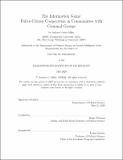The information game : police-citizen cooperation in communities with criminal groups
Author(s)
Miller, Andrew Cesare.
Download1221003830-MIT.pdf (10.95Mb)
Alternative title
Police-citizen cooperation in communities with criminal groups
Other Contributors
Massachusetts Institute of Technology. Department of Political Science.
Advisor
Roger Petersen.
Terms of use
Metadata
Show full item recordAbstract
Criminal groups -- gangs, mafias, and drug cartels, among others -- likely cause more deaths than interstate war, insurgency, and terrorism combined. This violence and the lack of accountability for perpetrators present a major challenge to states' central mandates of providing public safety and administering justice. States fall short of their mandates, in part because they struggle to gain cooperation from citizens. This study is about what I call The Information Game: the competition between the police, which want citizens to come forward with information about violence, and criminal groups, which want citizens to stay silent. I present cycle of silence theory, which posits that collective misperceptions prevent communities from reaching their full potential of police-citizen cooperation. Akin to terrorism, fear generated by criminal group violence makes retaliation appear to be more likely than it is. The violence has the underappreciated but potent second order effect of pushing citizens who are willing to cooperate to hide their disposition from others. Cooperation thus appears to citizens to be less of a norm than it is. I also take new methodological approaches -- namely, fielding the first large-scale virtual reality experiment -- to test realistically and ethically strategies aimed at promoting cooperation. The results show that providing access to anonymous tip lines, creating awareness of community cooperation norms, and in some circumstances, exposing citizens to police officers of the same ethnicity increase citizen information-sharing with the police. Employing a multi-method research design, this study draws on original surveys in Baltimore, Maryland (N=650) and Lagos, Nigeria (N=1,025) as well as proprietary survey data of criminal justice experts (N=2,700) and citizens (N=109,000) in 113 countries provided by the World Justice Project. I pair the quantitative analysis with first-hand observation as well as interviews with more than 150 citizens, state authorities, and criminal group affiliates.
Description
Thesis: Ph. D., Massachusetts Institute of Technology, Department of Political Science, May, 2020 Cataloged from student-submitted PDF version of thesis. Includes bibliographical references (pages 312-339).
Date issued
2020Department
Massachusetts Institute of Technology. Department of Political SciencePublisher
Massachusetts Institute of Technology
Keywords
Political Science.